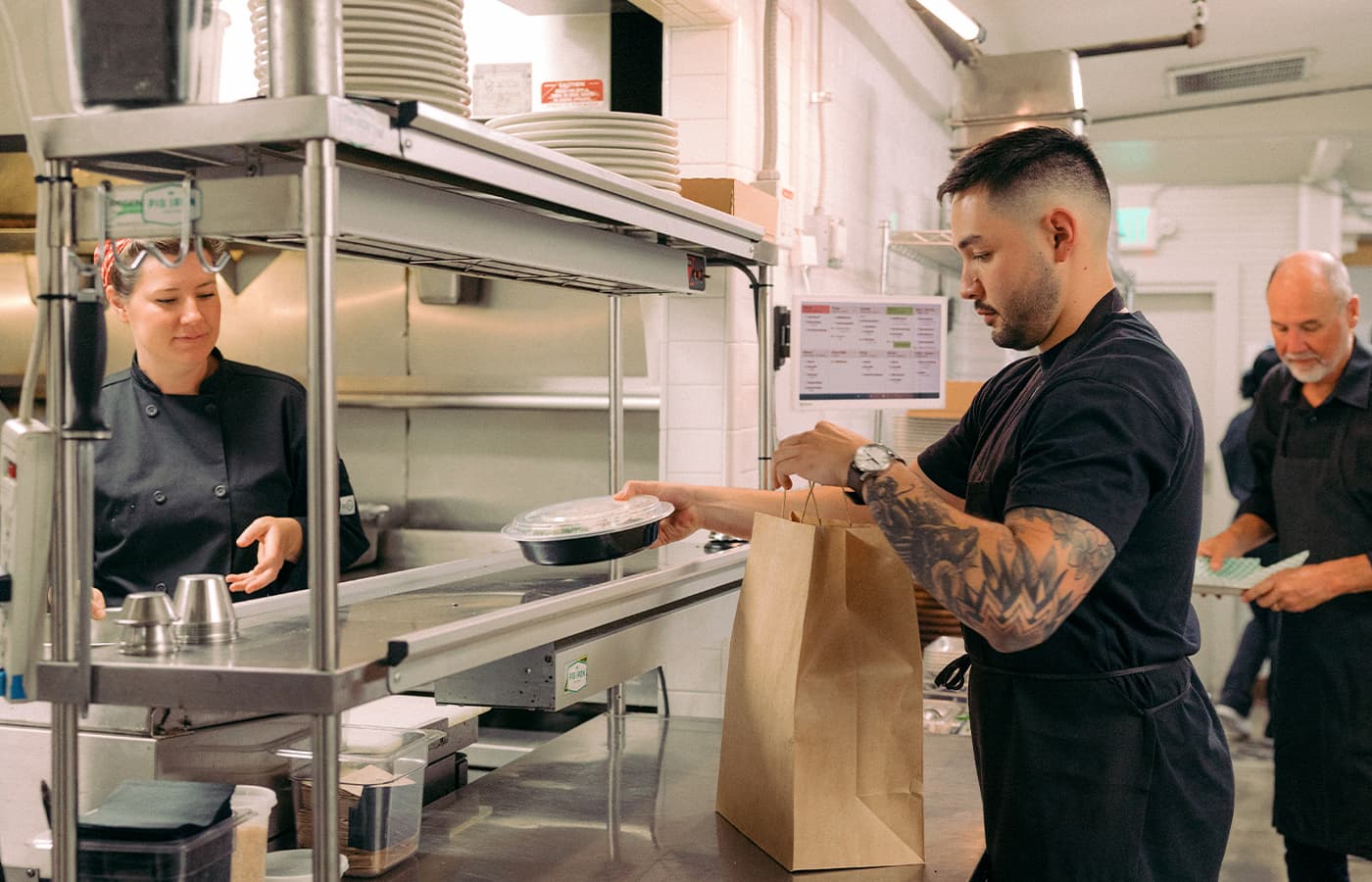How to increase restaurant revenue with online ordering (OLO) kitchens
Editorial Team
7 min read
The restaurant industry is in the midst of a significant transformation, driven by advances in technology and changing consumer preferences.
Among these is the migration away from third-party ordering apps, as 71% of customers prefer a restaurant’s own website or app due to the personalization, cost efficiency, and convenience they offer.
This data suggests that restaurants not only need to prioritize offering online ordering options directly through their own platforms, but also highlights a major opportunity to strategically shift operations to support the demand.
This has spawned the concept of secondary online ordering (OLO) kitchens designed to keep up with pick-up and delivery orders without impacting the experience of diners.
Read on as we delve into how full service restaurants can utilize OLO kitchens to enhance their operational efficiency, improve customer satisfaction, and ultimately increase their bottom line.
What are OLO kitchens?
So, what is OLO or an OLO kitchen, exactly? An OLO kitchen, or online ordering kitchen, is a dedicated space or secondary kitchen within a restaurant that focuses exclusively on preparing meals for online orders.
This concept has evolved alongside the rise of online ordering, driven by the increasing demand for convenience and quick service among consumers worldwide. With online orders and delivery growing 300% faster than dine-in traffic since 2014, the need for catering to online customers is just getting started.
The main features of OLO kitchens include:
- Dedicated space and staff: Separate from the dine-in area, ensuring that online orders are processed without disrupting in-house service.
- Streamlined workflows: Designed to handle a high volume of orders efficiently, reducing restaurant wait times and ensuring accuracy.
- Integration with technology: Utilizes advanced POS systems, such as Clover, to manage online orders, payments, and inventory seamlessly.
How to increase restaurant revenue with OLO kitchens
If you want to know how to increase revenue in a restaurant with online orders, here’s how an OLO kitchen can help you achieve just that and more:
Expand customer base
If you’re interested in how to increase online orders and subsequent revenue, it starts with expanding your customer base. By offering online ordering, full service restaurants (FSR) can reach a broader audience beyond their immediate locality. This includes busy professionals, families looking for convenient dining options, and those who prefer the comfort of their home when dining. An OLO kitchen allows restaurants to tap into these markets more effectively.
Increase order volume
The convenience of online ordering can encourage more frequent orders, but the speed and volume an OLO kitchen can produce makes your FSR a more dependable, desirable option. This is because customers are more likely to place orders when they know they can do so quickly and easily from their phones or computers. This can ultimately lead to a higher volume of orders compared to traditional walk-in or call-in methods, which can also result in creating more high-value regulars for your FSR business.
Higher average order value
Digital menus can provide seamless opportunities for upselling and cross-selling, while OLO kitchens ensure you can handle larger volume orders, especially during a rush. For example, when a customer orders a main dish, online ordering systems can suggest complementary items, such as appetizers, drinks, or desserts, to add onto the order. This simple sales strategy, paired with the operational boost of an OLO kitchen, can significantly increase the average order value.
Improving restaurant operations in OLO kitchens
Implementing an OLO kitchen is only part of the equation. To fully capitalize on this technique, full-service restaurants should integrate it with a robust Clover restaurant POS system, along with a user-friendly Kitchen Display System.
Here’s how restaurant technology integrations like these can help enhance operations for your OLO kitchen:
Streamlined order processing
POS systems like Clover can streamline order processing in restaurants, especially when paired with OLO kitchens, reducing the likelihood of errors that can occur with manual entry. Orders placed online are automatically sent to the kitchen, where the Kitchen Display System organizes them by priority and preparation time. This ensures that all orders are processed as accurately and promptly as possible.
Optimizing OLO kitchen workflows
Kitchen display systems (KDS) like those integrated with Clover’s restaurant POS help optimize kitchen workflows. They provide a digital interface where back-of-house staff can see all incoming orders, their statuses, and preparation times. This not only improves efficiency but can also help in managing busy stretches more effectively.
Real-time data and analytics
One of the most significant advantages of using POS systems is access to real-time restaurant analytics and data. Restaurant managers can monitor sales trends, peak order times, popular menu items, and more with the touch of a button. This data can help inform decisions on menu adjustments, staffing, and promotional strategies, ultimately leading to better operational decisions and increased restaurant revenue.
Building a dedicated OLO kitchen for your FSR
Ready to boost revenue at your full-service restaurant with an OLO kitchen? Here’s how to help get started with building and implementing a dedicated second kitchen of your own:
Assess your restaurant layout and space
Evaluate your current commercial kitchen layout or floor space to identify a suitable area for the OLO kitchen. This space should be as separate as possible from your main kitchen to ensure online orders are processed without disrupting in-house service.
This may require you to consider if renovations or adjustments are needed to create a functional and efficient workspace for online order preparation prior to proceeding.
Invest in restaurant equipment and technology
Equip your OLO kitchen with the necessary appliances and tools specific to preparing online orders. This may include ovens, fryers, prep tables, refrigeration, and storage units designed for high-volume, quick-turnaround cooking that align with your menu offerings.
Implementing restaurant technology, such as a robust Kitchen Display System that integrates with your POS system, can help manage and track online orders efficiently.
Design efficient workflows
Design the workflow of your OLO kitchen to maximize efficiency, much like you would with any commercial kitchen layout. This can include streamlining operational processes such as preparation, packaging, and delivery dispatch.
It is critical to ensure that the layout of your OLO kitchen facilitates easy movement and minimizes bottlenecks during peak times.
Select a reliable online ordering platform
It is important to choose an online ordering platform that integrates seamlessly with your existing POS system, while also considering factors such as user-friendliness, customization options, and customer support.
It can be helpful to consider choosing an online ordering solution that offers your business the opportunity to create their own OLO website, rather than using a third-party app. With this option, customers can purchase your menu items easily with all of the benefits of the usual apps but without the extra processing fees.
Specialized team roles
It is important to treat your OLO kitchen as its own operation rather than an extension of your existing restaurant business. To do this, assign specific roles to staff members dedicated to the OLO kitchen, such as order processors, chefs, and packers. This specialization helps maintain a smooth and efficient operation without role confusion.
Implementing cross-training and process guides can also be helpful to ensure that all team members can handle multiple tasks if needed, providing flexibility during peak hours.
Clover can help you run your OLO kitchen
Integrating Clover POS systems with your OLO kitchen can significantly boost your full service restaurant’s revenue.
With benefits ranging from expanding your customer base and increasing order volume to enhancing operational efficiency and leveraging real-time data, pairing a Clover POS with your OLO kitchen can be instrumental to the success of your restaurant business. Why wait? Elevate your business and get started with Clover POS systems today.
Related Posts
What is OptBlue by American Express®?
How to start a business in Arizona
Popular Topics
Stay in touch
Sign up and learn more about Clover.
Thank you for your subscription!
More posts about starting a small business
eBook





